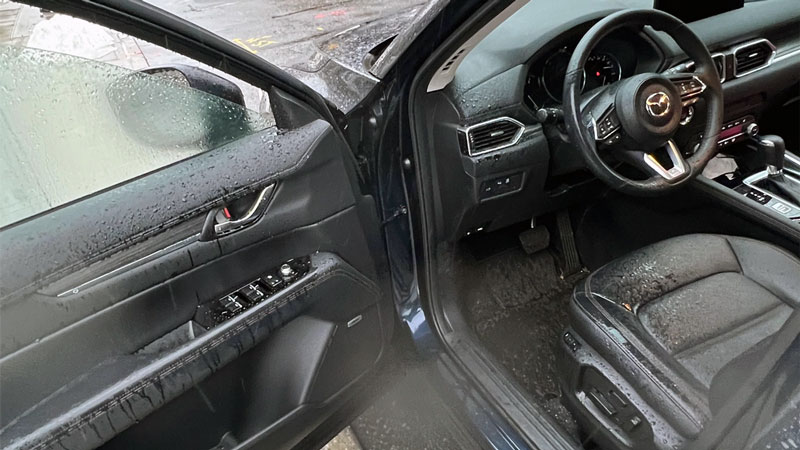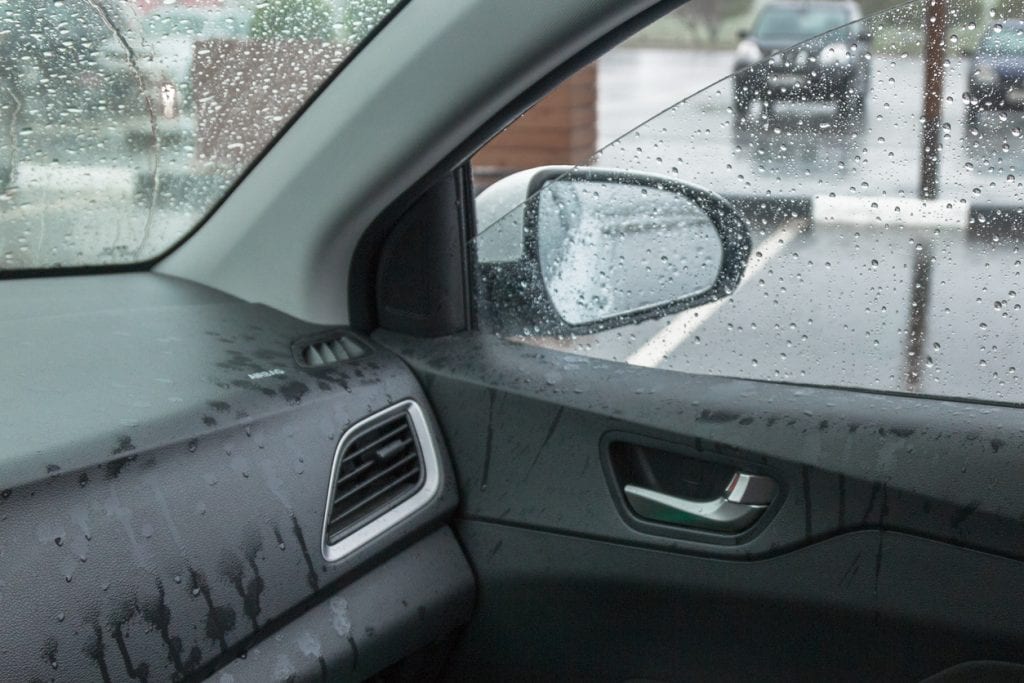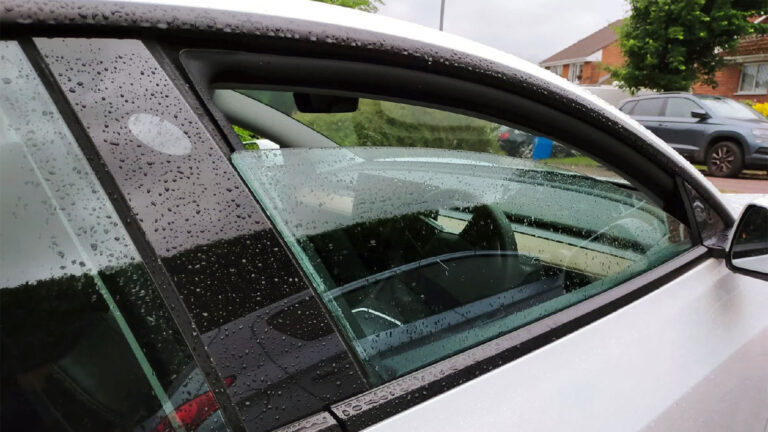If you accidentally left your car windows open in the rain, don’t panic. Firstly, dry the interior as much as possible with towels. Wipe down surfaces to prevent water damage and mold growth. Leave the windows down or doors open to air out the car.
If it’s sunny, let the sunlight aid in drying. Consider using moisture-absorbing products, like silica gel or baking soda, to combat lingering dampness.
If the rain is heavy, check electrical components for any issues and consult a professional if needed. In the future, make it a habit to double-check windows before leaving your car. Taking these simple steps can help minimize potential damage.
Why People Leave Car Windows Open in Rain

Forgetfulness: Many instances of leaving car windows open in the rain stem from forgetfulness. People might be in a rush, preoccupied, or dealing with distractions, leading to oversight.
Routine Variation: Changes in daily routines or driving habits can contribute. For instance, if someone is used to having their windows down for ventilation and encounters unexpected rain, they may forget to roll them up.
Multitasking: Drivers engaged in multitasking, such as taking phone calls or managing children, might inadvertently overlook closing windows when leaving the car.
Weather Misjudgment: Some drivers may misjudge the weather conditions, assuming it won’t rain or underestimating the severity of an incoming storm, leading them to leave windows open.
Comfort Zone: People may have a comfort zone with certain window configurations, and breaking from this routine can result in unintended consequences, such as leaving windows open during rain.
What Happens When You Leave Car Windows Open In Rain?
Leaving car windows open in the rain can damage the interior, causing stains, waterlogging, and electrical problems. It also creates conditions for mold growth, posing health risks and affecting the car’s appearance.
Potential damage to the interior
Rainwater can seep into the fabric of seats and carpets, leading to potential stains and water damage. Over time, this may result in unpleasant odors and deterioration of interior materials.
If the windows are left open during heavy rain, the flooring can become waterlogged, compromising the structural integrity of the car’s interior and potentially causing rust issues.
Water entering the interior can damage electrical components, affecting functions like power windows, seat adjustments, and audio systems.
Impact on electronics and electrical systems
Electronics within the car, especially those close to open windows, are susceptible to short circuits when exposed to rain. This can lead to malfunctions or permanent damage.
Persistent exposure to moisture can cause corrosion on electrical connectors and components, hindering their performance and potentially resulting in costly repairs.
If rainwater reaches the battery compartment, it may compromise the battery’s functionality, affecting the vehicle’s starting capabilities.
Risks of mold and mildew
The damp conditions created by rain entering the car provide an ideal environment for mold and mildew growth. These organisms can thrive in hidden areas, causing health concerns and a musty odor.
Prolonged exposure to mold spores can lead to respiratory issues and allergies. It’s crucial to address any signs of mold growth promptly to maintain a healthy interior environment.
Mold and mildew can tarnish the aesthetic appeal of the car’s interior, leading to the need for extensive cleaning and potentially costly restoration efforts.
How to prevent leaving car windows open in the rain?
Preventing the scenario of leaving car windows open in the rain involves cultivating a simple yet effective routine.
Before exiting your vehicle, take a moment to conduct a visual and physical check of all windows, ensuring they are securely closed.
This habit can be integrated into your overall departure routine, becoming a reflexive action that significantly reduces the likelihood of oversights.
Moreover, staying informed about weather forecasts plays a crucial role in proactive prevention. If there’s a possibility of rain, exercise extra caution by double-checking the windows before leaving your car unattended.
This strategic approach not only safeguards the interior of your vehicle but also contributes to a stress-free and hassle-free ownership experience.
By combining these practices, you establish a reliable system for preventing the inconvenience and potential damages associated with leaving car windows open during unexpected rain.
What to Do If You Left Car Windows Open In the Rain?

Immediate steps to minimize damage
- Interior Drying: Act promptly by using absorbent towels to dry the interior thoroughly. Pay attention to seats, carpets, and any other surfaces exposed to rainwater. This helps prevent water stains, odors, and potential mold growth.
- Airing Out the Car: If weather conditions permit, leave the windows down or doors open to facilitate air circulation. Sunlight is a natural aid in evaporating residual moisture, aiding in a quicker drying process.
- Moisture-Absorbing Products: Strategically place moisture-absorbing products like silica gel or baking soda within the car. These products can effectively absorb excess moisture, minimizing the risk of prolonged dampness.
- Check Electrical Components: Inspect critical electrical components for signs of water exposure. Address potential issues promptly to prevent long-term damage to the vehicle’s electrical systems. If there are concerns, seeking professional assistance is advisable.
Long-term solutions and damage control
- If the car was exposed to substantial rain and you’re uncertain about potential damage, consider a professional inspection. Experts can assess the extent of any hidden issues and provide recommendations for long-term solutions.
- Learn from the experience and establish preventive measures to avoid future occurrences. Develop a checklist or routine to ensure that car windows are properly closed before leaving the vehicle.
- Stay vigilant about weather forecasts, especially when parking outdoors. Being aware of potential rain can help you take proactive measures to protect your vehicle, such as ensuring windows are closed before inclement weather.
- Incorporate regular vehicle maintenance checks into your routine. This includes inspecting seals, weather stripping, and ensuring that windows operate correctly. This proactive approach can prevent water leaks and associated damage.
FAQ
Is it OK to leave car window open?
Yes, leaving car windows open is generally fine, but it can pose problems in unexpected rain. Rainwater may damage the interior, leading to stains, odors, and potential electrical issues. It’s advisable to be cautious and check the weather before leaving windows open.
How do you dry out a car left in the rain?
To dry out a car left in the rain, you can use absorbent towels to dry the interior thoroughly. Leaving the windows down or doors open to facilitate air circulation is helpful, and you may consider using moisture-absorbing products. This helps prevent water stains, odors, and mold growth.
Is it bad to leave your car wet?
Yes, leaving your car wet is not ideal, as it can lead to water stains, odors, and potential mold growth. Drying the car promptly after exposure to rain helps minimize these issues and prevents long-term damage to the interior and electrical components.
Should I dry my car after rain?
Yes, it’s advisable to dry your car after rain. Promptly drying the exterior and interior helps prevent water-related damage, maintaining the vehicle’s aesthetics and functionality. Pay attention to areas where water may accumulate, such as carpets and seats.
Should I wash my car after rain?
Yes, washing your car after rain is optional, but it can help remove accumulated dirt and contaminants. Regular washing maintains the vehicle’s appearance and protects the paint. However, immediate drying is essential to prevent water spots.
What should we do after the car is wet?
After the car is wet, you should dry the interior with towels, leave windows down or doors open for ventilation, and consider using moisture-absorbing products. This helps prevent water damage, odors, and mold growth, ensuring the car stays in good condition.
Does your car run better after a wash?
No, while washing improves the car’s appearance, it doesn’t directly affect its performance. However, regular washing and maintenance contribute to the longevity of the vehicle by protecting the paint, preventing rust, and preserving the overall condition.
How often should I wash my car?
The frequency of car washing depends on factors like weather, usage, and personal preference. Generally, should you wash every two weeks is a good starting point. However, adjust based on environmental conditions, such as exposure to rain, dirt, or pollutants.
Final words
If you accidentally leave your car windows open in the rain, don’t worry—act quickly to dry the inside, let the car air out, and use moisture-absorbing products. Remember to check for potential electrical issues and consider professional help if needed.
Learn from the experience by developing habits to prevent future mishaps, like closing windows before leaving. Stay weather-aware and integrate regular vehicle checks to keep your car in good shape.

